Posts Tagged ‘Startups’
139 World Without Waste w/ Steve Pratt CEO of AI Startup Noodle
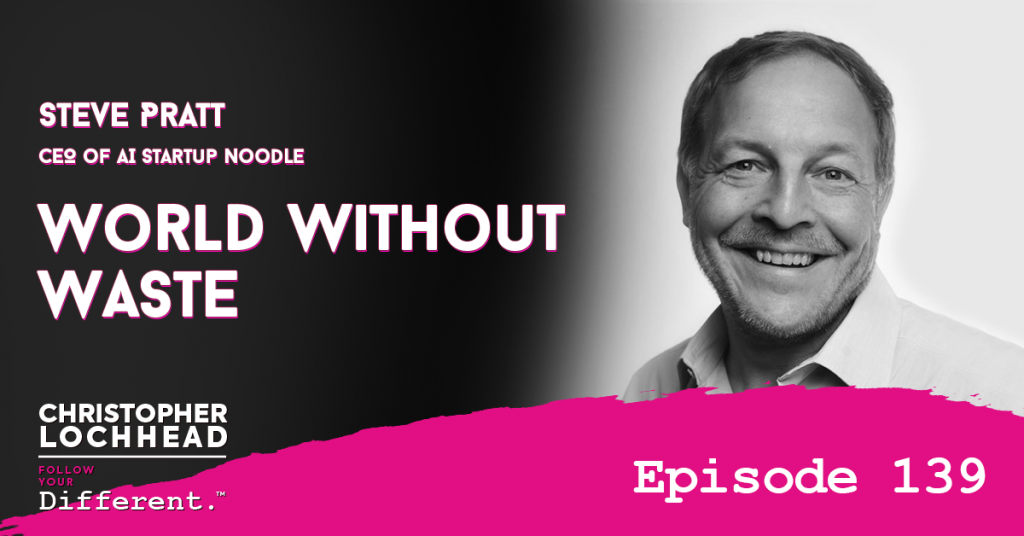
Podcast: Play in new window | Download (Duration: 59:58 — 82.7MB) | Embed
Subscribe: Apple Podcasts | Spotify | Pandora | RSS | More
This is our second in our two-part series on Digital Business, with Steve Pratt, CEO of Noodle.AI, the remarkable startup on a mission to changing global manufacturing and supply chain business.
We have a real conversation about how the combination of Machine Learning / AI, The Cloud, IoT and deep data analytics can come together to reduce both economic and environmental waste.
In case you missed the first part of this two-part series with Business Guru Big Ben Rewis, check it out: Episode 138.
Missionary CEO
Christopher has known Steve for over 30 years. He has a vast and impressive experience in digital marketing, starting with the creation of CRM business for Deloitte. He was also the founder and CEO of the InfoSys Consulting Practice and he also led IBM Watson’s initiatives.
Steve has deep experience in building and managing massively successful, deep technology businesses. He has some powerful insights, through his company Noodle.Ai, into how modern technology can reduce economic and environmental waste. This is what Christopher calls a great example of a missionary CEO, where the E stands for Evangelist.
“The intention of the company is to apply data science to create a world without waste. We reject this notion, historically, that you had to choose between profits and the planet.” – Steve Pratt
World Without Waste
Steve shares how companies have scaled things right now. They have created amazing hyper-growth for their companies, but have also accumulated huge amounts of waste.
“We have over 500 billion dollars of excess inventories sitting in warehouses. We got 50% of trucks driving around, empty. We have about 400B dollar of stuff, that is thrown out in the manufacturing process because of quality defects. These are all preventable.” – Steve Pratt
A lot of people analyzed where the waste is in the world and over 90% of the waste in the world is due to manufacturing and logistics. Steve points out that due to bad computations, companies are manufacturing trillion dollars of goods and let it sit in their storage, because they couldnt get it out to the market.
Environmental Sustainability
Steve shares about steel manufacturing company Big River Steel, which they granted a lead certification for environment sustainability.
“With our applications, that consumption to reduce inventory levels, reduce quality defects and they are the most profitable, per employee, the highest profit per mil hour, the lowest environmental impact of any steel known in the world.” – Steve Pratt
Christopher and Steve then discussed that companies should analyze data that is readily available to them. This is can easily be achieved through the help of various technologies available.
To hear more about how digital businesses can achieve a world without waste and other insights of Steve, download and listen to this episode.
Bio:
Stephen is an instigator, agitator, and pioneer in creating world-class technology services organizations.
He has spent his career building innovative ways to create value for the world’s most important organizations.
Prior to Noodle, he was responsible for all Watson implementations worldwide for IBM Global Business Services.
He also was the founder and CEO of Infosys Consulting, a Senior Partner at Deloitte Consulting, and a technology and strategy consultant at Booz, Allen & Hamilton.
He twice has been selected as one of the top 25 consultants in the world by Consulting Magazine.
He has Bachelors and Masters degrees in Electrical Engineering from Northwestern University and The George Washington University focused on Satellite Communications.
For fun, Steve plays competitive tennis, races sailboats, and formerly was a crazed rugby player. He enjoys playing acoustic guitar for his children (not ready for prime time).
Links:
We hope you enjoyed this episode of Follow Your Different™! Christopher loves hearing from his listeners. Feel free to email him, connect on Facebook, Twitter, Instagram and subscribe on iTunes!
138 Digital Business Guru Big Ben Rewis
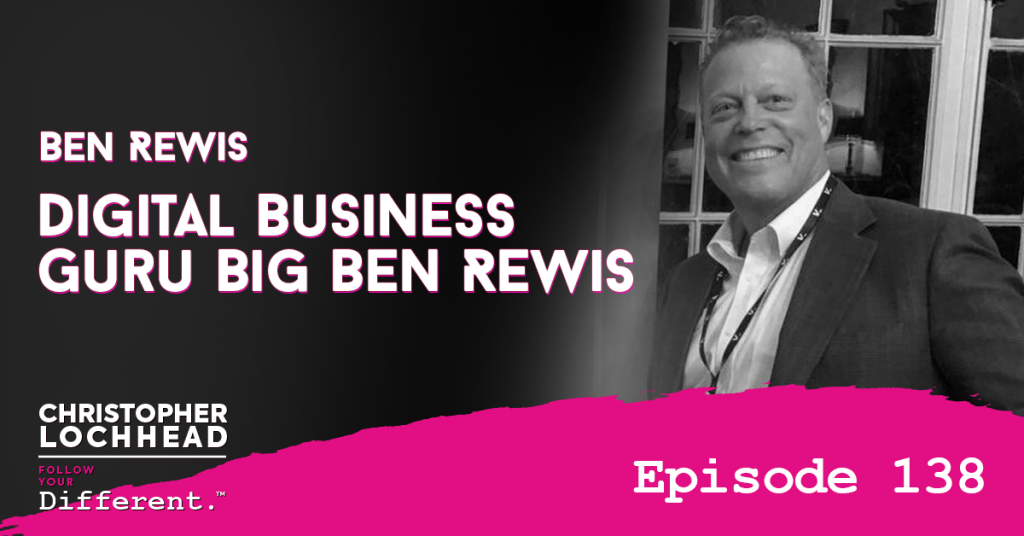
Podcast: Play in new window | Download (Duration: 1:05:16 — 149.7MB) | Embed
Subscribe: Apple Podcasts | Spotify | Pandora | RSS | More
This is our first in a special two-part series on Digital Business. The legendary Big Ben Rewis joins us today to have a real, powerful conversation about digital businesses today and how big data can contribute to sustainability.
In our next episode, watch out for Steve Pratt CEO of Noodle.AI, the remarkable startup changing global supply chains.
Surfer, Snowboard, Advisor
Big Ben is one of the most extraordinary adventure athlete’s of this time. He is a skier, snowboarder, sailor, and surfer. In fact, one of his first few sponsors were Jake Burton, the founder of Burton Snowboards.
Today, when he’s not surfing or on some kind of adventure, Ben Rewis would most likely be dishing digital business advice to Fortune 100 companies and startups in Silicon Valley. He has deep experience in building and managing massively scalable digital business and payments infrastructure.
Digital Business Guru
Just to name a few of Ben’s contributions, he created the Internet e-Commerce team for Visa. He was also Head of Security & Fraud Technology for First Data and he’s an advisor to a startup Verdant Robotics, a startup doing amazing things with AI & Machine Learning in the smart agriculture category.
“I think there’s a lot of themes, there’s a lot of organizational and technical similarity across all of them. The whole notion of data in the digital business is just fascinating, what’s happening in the industry today. Cause you know, like the industry quote ‘software is eating the world.’” – Ben Rewis
Digital Business is the Future
Digital businesses are not brand new, as they have been around a long time.Ben now shares that people are realizing the by-product of their digital business can infect more businesses.
“Digital businesses don’t necessarily have new value-added services that are data-based. They may have a legacy product or service, that is digital and they realizing that the data that is produced by that service can help them generate new revenues, or cut costs.” – Ben Rewis
To hear more about how digital businesses can greatly influence sustainability efforts for the future and other insights of Ben, download and listen to this episode.
Bio:
Ben Rewis was raised in New England north of Boston, the eldest son of two high school teachers.
After graduation from The Stowe School in VT., he moved to San Francisco, CA at age 17 and have been in technology ever since.
Today, he’s an advisory consultant to startup CEOs, and a deep payments expert with solid leadership and innovation skills.
Facilitator, speaker, communicator, thinker and doer, able to bring different constituencies together around a common digital business vision and set of deliverables.
Able to drive from big picture down to concrete initiatives. Passionate about helping teams solve challenges for strategic alignment.
In addition to his business involvement with major companies, he has decades of wilderness and group leadership experience, becoming an Outward Bound instructor at age 21, and taking part in numerous adventure expeditions around the world.
He’s crossed deserts and canyons, sailed the Tasman Sea, and climbed mountains like McKinley.
He enjoys just about all board sports, competed in the first world championships for snowboarding, and learned to surf at age 40.
Ben co-founded the Drop In Coalition, and is an Advisory Board Member of the Save The Waves Coalition, and was honored in 2019 as a Royal Geographic Society Fellow.
Links:
We hope you enjoyed this episode of Follow Your Different™! Christopher loves hearing from his listeners. Feel free to email him, connect on Facebook, Twitter, Instagram and subscribe on iTunes!
131 How to Build Billion Dollar Startups w/ David Sacks
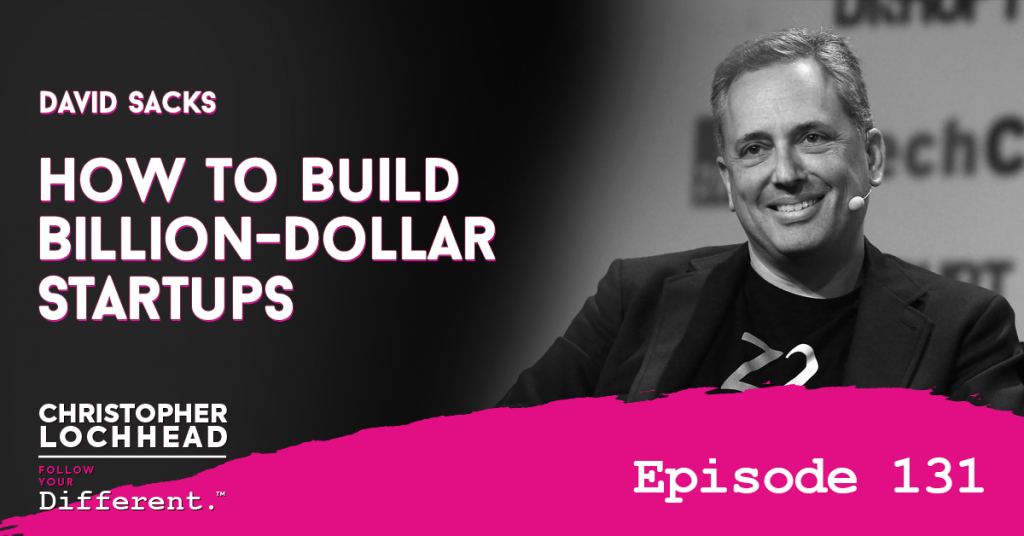
Podcast: Play in new window | Download (Duration: 1:00:03 — 82.7MB) | Embed
Subscribe: Apple Podcasts | Spotify | Pandora | RSS | More
In this episode, we have a real conversation about legendary entrepreneurs and investor David Sacks about how to build billion-dollar startups.
We talk about how startups go off the rails and what is ok and not ok to lose money on. We also touch on why B2C strategies have become powerful for B2B companies and many more! If you’re an executive or an entrepreneur, even if you’re outside of tech, get your pen ready. there’s a ton on this episode!
Legendary VC
We continue our run of legendary VCsc with David Sacks. He was a co-founder of PayPal, Founder, and CEO of Yammer and Founder of Craft Ventures. Some of his investments include Facebook, Uber, SpaceX, Palantir Technologies, Airbnb and Bird
This is another great example of the power of a real dialogue podcast.
“You know the old line of ‘nobody ever got fired for buying IBM’? I think that the modern version of that saying would be ‘no one ever got fired for buying the category leader’ and if you become the category leader, you just get all these sales by default.” – David Sacks
Going Off The Rails
David shares how he witnessed high profile companies going off the rails for several reasons. He noted that aside from product-market fit, there are other mundane reasons why these companies fail. Here’s the big list that could go wrong in high growth companies:
“One is commoditization, the rest of the world catches up the startups innovation. Two, cost of customer acquisition, a bunch of reasons it could happen. Third, margin problem, negative gross margins. Fourth, external dependency. Fifth, leaky bucket, there’s a problem with retaining customers. Sixth, regulatory compliance, then, sales compliance problem, that’s seven. Eight, doing things that don’t scale. Nine would be the founder psychology problem which is pushing things too far and tenth, company culture problem. One the 10.1 mark, macro shock where the company goes out for financing and isn’t able to raise around because of one of the problems I mentioned in them. Everything comes to head and you had a car crash.” – David Sacks
The Challenge for Startups
One of the greatest fears of startups Is commoditization. David says there is always a risk of the competition catching up in terms of software design. He encourages startups that it is a trade-off to make, to move fast enough to maintain market leadership.
“Everyone is running around with their hair on fire but they’re afraid that their innovation gets copied. If you’re not moving fast enough, you’re on a bit of hamster wheel. If you’re not moving fast enough, you’re running in place.” – David Sacks
To hear about David’s thoughts on how to define and dominate a market category, what areas of technology David thinks have the most promise and more, download and listen to this episode.
Bio:
David Sacks is a highly accomplished entrepreneur and investor in internet technology firms.
He is general partner of Craft Ventures, a venture capital fund he co-founded in late 2017. Previously as an entrepreneur, Sacks was the founding COO and product leader of PayPal (acquired by eBay in 2002 for $1.5 billion) and Founder/CEO of Yammer (acquired by Microsoft in 2012 for $1.2 billion).
In 2016, he led the turnaround of Zenefits as interim CEO.
In 2017, Sacks co-founded blockchain startup Harbor as an incubation of Craft Ventures.
His angel investments include Facebook, Uber, SpaceX, Palantir Technologies, Airbnb and Houzz.
Links:
We hope you enjoyed this episode of Follow Your Different™! Christopher loves hearing from his listeners. Feel free to email him, connect on Facebook, Twitter, Instagram and subscribe on iTunes!
110 Startup Marketing: Viviana Faga Emergence Capital
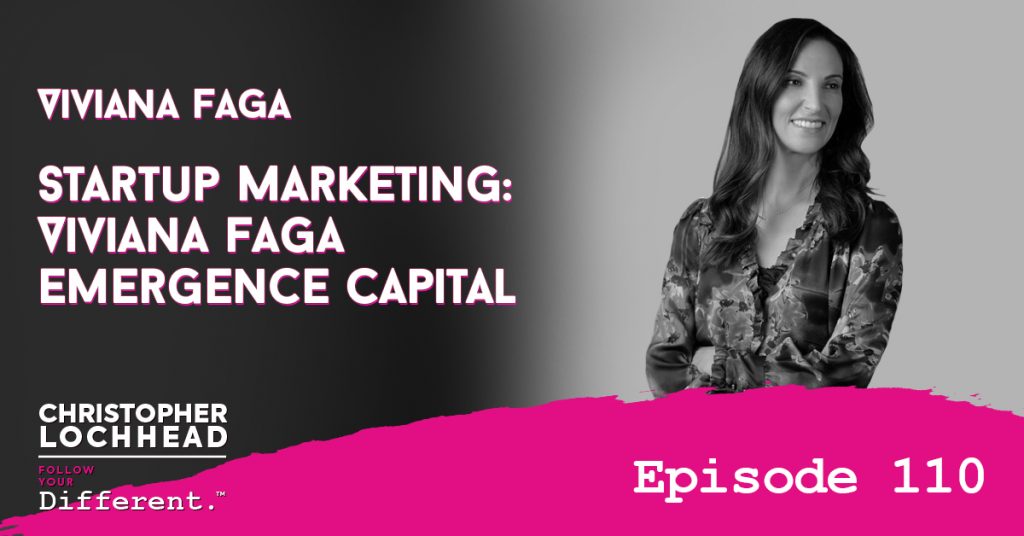
Podcast: Play in new window | Download (Duration: 1:03:10 — 58.1MB) | Embed
Subscribe: Apple Podcasts | Spotify | Pandora | RSS | More
We have another riveting and insightful episode today with Viviana Faga, Operating Partner at Emergence Capital. She is in-charge of marketing and helped create over 150B in new market cap. Today she shares some of her amazing experiences working both with startups and VCs.
The Importance of Marketing
Viviana Faga worked in Senior Marketing roles with companies like Salesforce.com and Zoom Communications. She was the Head of Marketing at Yammer and pioneered the enterprise social space.
At the moment, she coaches CEOs and Founders and leads them in finding the importance of marketing in scaling their businesses.
“You just got $5-15M and you’re thinking, ‘where do I want to spend my money? I want to spend money on building my product and I don’t know who to hire? Why should I hire a marketer? It just seems like one big massive waste.’ That’s what I deal with and those are the kind of questions that I get everyday.” – Viviana Faga
The Best Doesn’t Always Win
Viv narrates her current client who has a great product, but is currently in a category that his competition built. Viv find it fascinating to explain that the best products doesn’t always win. If a CEO doesn’t believe in this, the CEO then finds himself in a never ending cycle of “catch-up.”
“There are plenty of cases where it does. The company just sort of takes off, without great marketing. We’ve seen that. But for the most part, in the competitive market, if you don’t define the category, if you don’t create it, you’re going to really struggle because now you’re gonna look like you’re playing catch up.” – Viviana Faga
Viv advises her clients that the company will never be able to catch up if they continue copying the competition’s message.
“You have to change the game. Come up with completely new messaging. You have to go so hard at writing that message — from your press releases, website and sales collateral. Every single piece of content that is external facing has to speak this new language.” – Viviana Faga
CEOs Who Listen
Viviana was proud to say that she embedded herself into her client’s company. Other than this, she believes that she can only help those who are willing to listen. She narrated how she turned down the CEO of Yammer, twice.
“It was hard to turn him down, but obviously he convinced me. I wanted to work for a CEO who understood the value of marketing and after that conversation, I wasn’t so sure but a lot of folks from Salesforce have gone there. It’s our job to convince him Sales & Marketing matter.” – Viviana Faga
To hear more about Startup Marketing: Viviana Faga Emergence Capital and more relevant information about Viviana Faga, download and listen to the episode.
Bio:
Viviana brings over fifteen years of experience designing and building brand categories for successful cloud/SaaS and enterprise social companies, helping them create scalable growth engines that drive successful exits.
Her particular passions are scaling and structuring go-to-market SaaS teams, messaging and positioning, category creation, freemium product strategy, and sales enablement.
Before joining Emergence, Viviana served as VP of marketing for Yammer, where she defined the enterprise social category. After Yammer’s $1.2B acquisition by Microsoft, she became its head of marketing for enterprise social, which included Office 365, Skype, and Lync. She also spent over six years at Salesforce, where she launched several key product initiatives. Additionally, she was the VP of marketing for Platfora (now Workday) and the CMO of Zenefits.
Links:
Emergence Capital – Viviana Faga
103 The Power of an IPO with Eric Yuen
011 The Perception of your product is your product
We hope you enjoyed this episode of Follow Your Different™! Christopher loves hearing from his listeners. Feel free to email him, connect on Facebook, Twitter, Instagram and subscribe on iTunes! Get amazing, different stories on business, marketing, and life. Subscribe to our newsletter The Difference.
020 The Power of Podcast Guesting w/Tom Schwab, CEO of Interview Valet
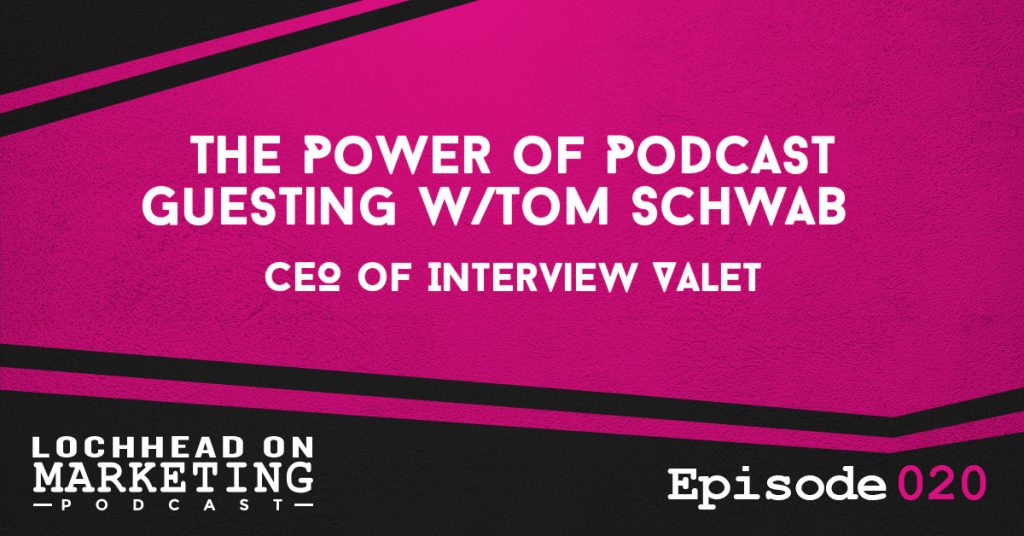
Podcast (lochheadonmarketing): Play in new window | Download (Duration: 46:36 — 42.8MB) | Embed
Subscribe: Apple Podcasts | Spotify | RSS | More
From time to time, we will bring on guests to go deep on a topic in a particular field. Today’s guest is Tom Schwab, founder of Interview Valet. As we celebrate International Podcast Day, we will discuss the power of podcast guesting and why it is a strategic component of legendary marketing today.
Connecting with People
Tom stresses the importance of podcast guesting, especially for business executives, authors, and entrepreneurs. He believes exposure brings opportunity and podcast guesting is one of the most intimate and targeted ways for customers to know somebody.
“I love podcasts because its a way to really connect with people. You’re not yelling, you’re talking with them. They’re choosing to listen to you.” – Tom Schwab
Mainstream Media vs. Podcasting
Tom discusses how powerful podcasting. He says it should be a major part of one’s content strategy. In mainstream media, aside from the cost to advertise (television, print, and radio), one acquires a limited time and limited space, unlike in podcast guesting, where it reaches hundreds of thousands, overtime.
“You’re tapping into an audience, getting that like and trust, getting introduced by someone, they already know. The other thing too is, if you do a live speech, it’s really hard to repurpose that content. If you do a podcast interview, you can do the transcript to make blogs.” – Tom Schwab
Christopher agrees with Tom, as he speaks based on experience. He mentions how he appears on different mainstream media and only get to share a portion of his thoughts for a few seconds.
“Podcast interview is an easy and scalable way to really go deeper. People will understand you and what really drove you, why you got into the business. People should know they could like and trust you. That’s really hard to do in a 30 sec clip or a little Facebook ad.” – Tom Schwab
The Golden Age of Podcasting
Tom cites Harvard University and the conference that they organized last year on podcasting. They call this time as the Golden Age of Podcasting and there is never the best time to explore podcast advertising other than at the present time.
Christopher also shares that there is a lot of whitespace opportunity in podcasting. He believes that there is a high value for sponsors because podcasts provide a high level of intimacy in terms of getting to know the guests through a conversation.
“I think today, brands want to know the heart behind it. Those people that can get out there early and explain that, not in an ad but in an actual conversation. To me, that’s where you can really build up a lifetime value of a customer.” – Tom Schwab
To hear more about the power of podcast guesting and more relevant information from Tom Schwab, download and listen to the episode.
Bio:
Tom Schwab knows how to build an online business.
He’s done it successfully several times and now helps others find online success with podcast interview marketing.
Marketing at its heart is starting a conversation with someone who could be an ideal customer.
Tom helps thought leaders (coaches, authors, speakers, consultants, emerging brands) get featured on leading podcasts their ideal prospects are already listening to. The Interview Valet system then helps them to turn listeners into customers.
The author of Podcast Guest Profits: Grow Your Business with a Targeted Interview Strategy, Tom is also Founder/CEO of Interview Valet, the category king of Podcast Interview Marketing.
Links:
We hope you enjoyed this episode of Lochhead on Marketing™! Christopher loves hearing from his listeners. Feel free to email him, connect on Facebook, Twitter, Instagram and subscribe on iTunes! You may also subscribe to his newsletter, The Difference, for some amazing content.
051 Should I Start a Business?
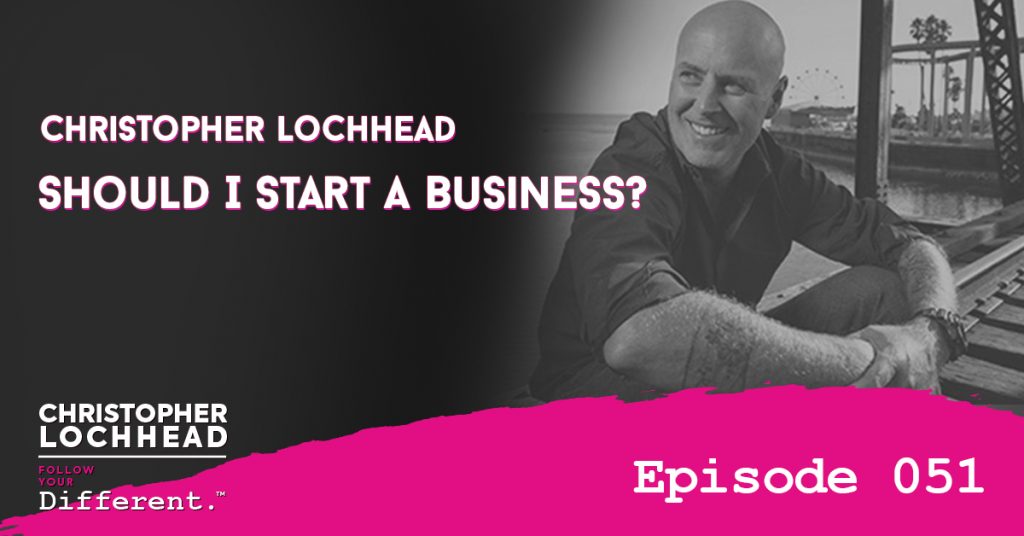
Podcast: Play in new window | Download (Duration: 7:55 — 18.4MB) | Embed
Subscribe: Apple Podcasts | Spotify | Pandora | RSS | More
On today’s special episode, Christopher answers a question from a young woman who wants to know whether she should start a business. He touches on two points: the effect of formal education on entrepreneurial success and the distinction between missionaries and mercenaries.
Entrepreneurship is Not for Everybody
Christopher received an email from a 20-year-old woman thinking about leaving school to starting a business. Perhaps inspired by his own story, she sought out his help.
With very few options after getting thrown out of school at 18, Christopher started a business. Entrepreneurship was a way out of a life of struggle for him. However, even a huge proponent of entrepreneurship like Christopher thinks it is not the answer for everybody.
“It’s an interesting thing that for many entrepreneurs, entrepreneurship is the only root that we have.” – Christopher Lochhead
Education Remains Valid for Most
The first thing that you should ask yourself when you consider quitting school to start a business is whether you are really ready. True, a lot has been said about success after dropping out and how college is slowly dying.
But according to the Kauffman Foundation, adults without formal education are much less likely to be entrepreneurs than their educated counterparts. Research also shows that the more educated you are, the more you are going to make. While the media portrays lots of dropout-turned-rockstar tales, the truth is that most entrepreneurs get some education.
“This is coming from a guy who didn’t go to school. but I think you need to think twice before dropping out because for most people, school pays off.” – Christopher Lochhead
Are You on a Mission?
Another question to ask: are you a missionary or a mercenary? Christopher’s buddy Eddie Yoon makes this very important distinction. If you are the latter, then you are going to tap out when it gets hard.
There will be massive losery along the way and the disappointments will be huge. Things that will make you want to quit will happen on a fairly regular basis. Being mission-driven, like what most top VCs dub successful entrepreneurs, is the way to charge forward.
“Your commitment to the mission is what will get you through the hard parts. And there will be hard parts and the hard parts will be way worse than anybody ever expressed to you.” – Christopher Lochhead
To hear more about Christopher’s take on whether you should start a business, download and listen to the episode. Got a question for Christopher? Email him at bl*******@******ad.com.
Link:
Quora – What would be your advice for a 21-year-old starting a company?
We hope you enjoyed this episode of Follow Your Different™! Christopher loves hearing from his listeners. Feel free to email him, connect on Facebook, Twitter, Instagram and subscribe on iTunes!
047 B2B Enterprise Tech On Fire with Christopher Lochhead
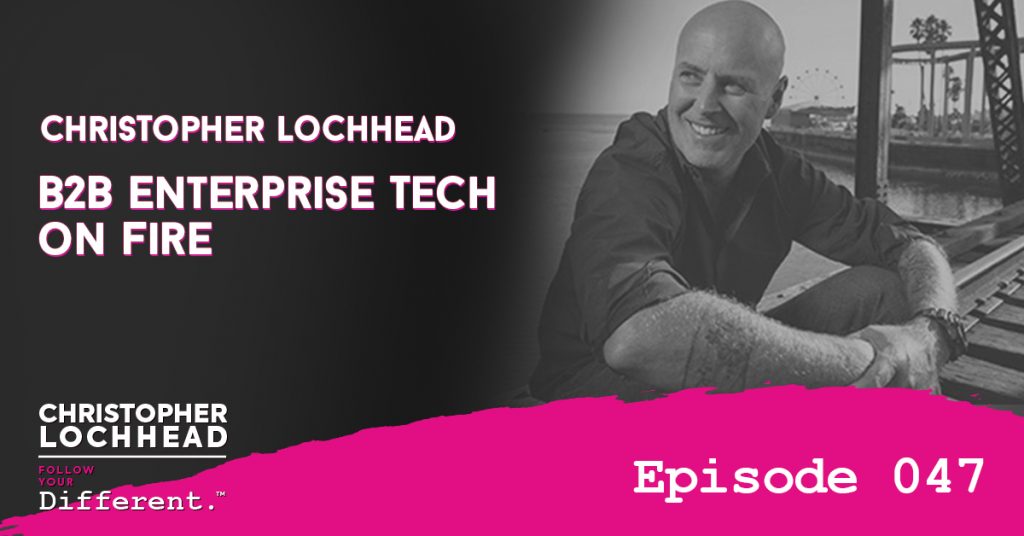
Podcast: Play in new window | Download (Duration: 15:41 — 14.6MB) | Embed
Subscribe: Apple Podcasts | Spotify | Pandora | RSS | More
On this episode, Lochhead shares some of the amazing things going on in the enterprise tech industry.
Enterprise Tech on the Rise
Back in 2012, the legendary venture capitalist Jim Goetz of Sequoia made a declaration that tech entrepreneurs were too focused on the consumer world and have ignored the $500-billion market opportunity, which is the enterprise space. Soon after, the Cloud went bigtime—the tipping point for a lot of big innovations.
Bob Evans of the awesome podcast Cloud Wars said that for Q1 of 2019, Microsoft, Amazon and IBM will combine for $23 billion in Cloud revenue.
“Twice as many enterprise startups have become billion-dollar companies compared to consumer startups.” – Jim Goetz, Senior Partner Sequoia Capital
The Golden Age
Over the last 10 years, there has been an acceleration of innovation. According to Lochhead, this is the greatest time in history to be in the tech industry and particularly in the tech enterprise industry.
“The enterprise space is—if you’re willing to dig it out, if you’re willing to work hard on it and be smart—it’s less binary than the consumer space. With grit, some intelligence, some great technology and some category design, you can really make something of yourself.” – Christopher Lochhead
Enterprise vs Consumer Tech Companies
Rolfe Winkler, the author of the article, The Tech IPO Delivering the Most for Investors, points out that enterprise companies produced a median of 126% stock growth, compared to a median of 15% increase for consumer tech companies.
Consumer tech is a hit business, but it is hard to predict in a way that enterprise tech is not. Christopher also thinks that it’s getting tougher to find new niches in the consumer side and startups are afraid of the big players.
“Consumer-focused businesses may have more cachet, but technology startups that cater to companies are what is really hot.” – Rolfe Winkler, The Wall Street Journal
To hear more about the dynamic enterprise tech industry download and listen to this episode.
Bio:
Christopher Lochhead is a #1 Best Selling Amazon Author and “Top
30” rated Podcaster. He is a former 3 time public company Chief Marketing
Officer in the enterprise technology business where he spent more than 2/3 of
his career. He’s been called “one of the best minds in marketing” by The
Marketing Journal, a “Human Exclamation Point” by Fast Company, a “quasar” by
NBA legend Bill Walton and “Off-putting to some” by The Economist.
He co-authored two best seller
books:
• Niche Down: How To Become Legendary By Being Different
• Play Bigger: How Pirates, Dreamers, and Innovators Create and Dominate Markets.
Links:
Links for Articles and Data Sources:
“As Cloud Market Roars, Microsoft, Amazon and IBM Will Total $23 Billion in Q1 Cloud Revenue”
We hope you enjoyed Christopher Lochhead on this episode of Follow Your Different™! Christopher loves hearing from his listeners. Feel free to email him, connect on Facebook, Twitter, Instagram and subscribe on iTunes!
016 Startup Founders Mental Health
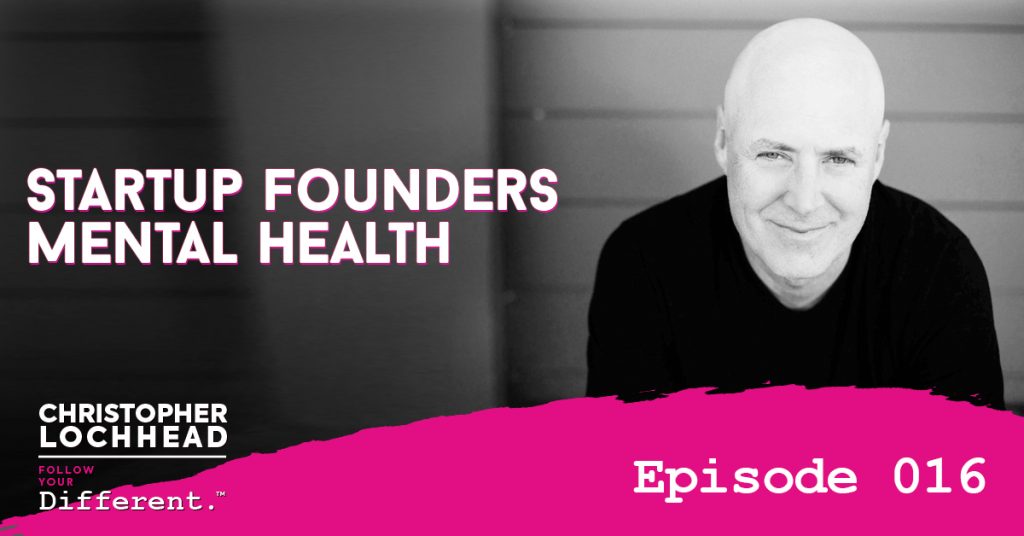
Podcast: Play in new window | Download (Duration: 6:59 — 6.5MB) | Embed
Subscribe: Apple Podcasts | Spotify | Pandora | RSS | More
On today’s episode, Christopher talks about a relevant TechCrunch article on startup founders mental health written by Jake Chapman. He also shares how he’s able to go through his own mental health concerns.
“Just like we can proactively design our life and our business, we can proactively design our mental health.” – Christopher Lochhead
Entrepreneurs and Founders: Mental Health
In a study by Michael Freeman, it is said that 50% of entrepreneurs are susceptible to a mental health condition. Some specific conditions are prevalent among young startup founders. These include depression, ADHD, substance abuse, bipolar disorder, psychiatric hospitalization, and suicidal thoughts.
Indeed, Aristotle once said that there’s no great genius without a touch of madness. While some of the wacky can help a person be creative, it’s also quite hard to deal with. To address this, there first needs to be mental health awareness within ourselves and also in our entrepreneurial leaders.
“The second thing I tried to do is to create a structure for myself and for my life that acknowledges who I am.” – Christopher Lochhead
Becoming Self-Aware
Christopher has personally gone through a lot of training and therapy to become a self-actualized person. He trained himself to increase his self-awareness. He used his own intelligence to manage his emotions and prevent them from getting the best of him.
“Even if I’m feeling really shitty, at least in some level, I know that this is an overreaction and that this, too, will pass.” – Christopher Lochhead
Getting Help from People
He also surrounds himself with people who know and love him for who he is. When he’s in a dark place, they know how to support him and love him through it. Most importantly, they know when to stop putting up with it and give him a nudge whenever he wallows in his self-pity for too long.
Professional help, of course, is always an option and nothing to be ashamed of.
To hear Christopher Lochhead share more insights into mental health, download and listen to the episode.
Links:
Investors and entrepreneurs need to address the mental health crisis in startups
Entrepreneurs Touched with Fire
Suicide Prevention Lifeline Chat
Suicide Prevention Lifeline 1-800-273-8255
We hope you enjoyed this episode of Follow Your Different™ on Startup Founders Mental Health! Christopher loves hearing from his listeners. Feel free to email him, connect on Facebook, Twitter, Instagram and subscribe on iTunes!

